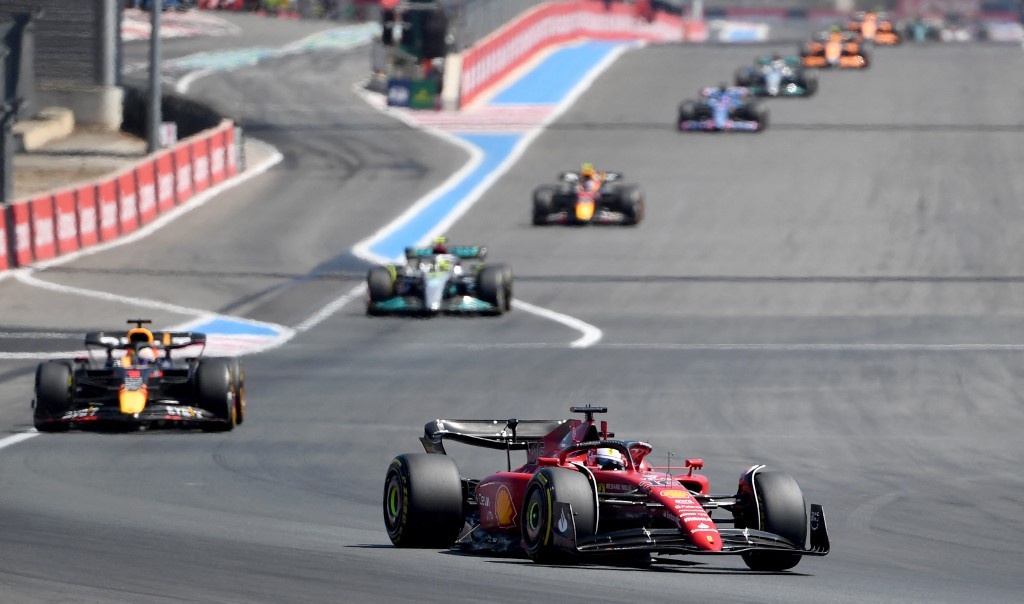How F1 is helping Vietnam strive for a sustainable future
How can F1, a sport with a notorious reputation for burning excessive amounts of fuel, assist Vietnam in striving for a sustainable future?
This was discussed in recent interviews with F1 technical director Pat Symmonds and F1 managing director Ross Brawn, who announced fully sustainable fuels and the implementation of ‘drop-in’ fuel by 2026, on course for the organisation’s goal of being carbon neutral by 2030.
 |
| Ferrari's Monegasque driver Charles Leclerc leads ahead of Red Bull Racing's Dutch driver Max Verstappen during the French Formula One Grand Prix at the Circuit Paul-Ricard in Le Castellet, southern France, on July 24. Sylvain Thomas / AFP |
Why is F1 so important for a sustainable future?
To understand how F1’s development can aid Vietnam in the race to a net zero carbon future, we must first understand the current steps that F1 as an organisation has taken towards its goal of being net zero and where it began as well as the significance that F1 plays in promoting change for sustainability.
Ever since its founding in 1950, F1 has been at the forefront of motorsport and the automotive industry as a whole. F1 served not only as a means of entertainment but also as testing grounds to pioneer cutting-edge technology before being generalised in the automotive industry.
An example of this would be the implementation of the Motor Generator Unit - Kinetic (MGU-K) which had been the father of the current generation of Kinetic Energy Recovery Systems in modern automobiles that recover energy through engine braking to improve the efficiency of internal combustion engines.
But why is F1 currently developing a sustainable fuel? After the 2019 season came to a close, F1 announced its goal to be carbon neutral by 2030, covering on-track activities such as races as well as operations of the sport as a whole.
Since then, there have been impactful steps taken towards the organisation’s goals such as improving transportation efficiency as well as transitioning to fully renewable energy in F1 offices.
Ross Brawn states that this announcement and development plan do not only serve the purpose of reaching the net zero goal for F1 but also move the automotive industry in the direction of developing sustainable fuels. The fuel has also been purposely designed with a ‘drop-in’ feature to accelerate adoption and reduce costs for use in current internal combustion engines.
How sustainable fuels can help Vietnam grow towards a sustainable future?
On Vietnam’s agenda of becoming a net zero emissions country by 2050, resolutions and plans have been made towards reducing emissions in the transportation sector.
Of particular note is the promotion of public transportation as well as the limitation of motorbikes in five major cities Hanoi, Haiphong, Danang, Can Tho, and Ho Chi Minh City, with debates as to the necessity of partially or completely restricting the use of motorbikes in several districts of these cities after 2030.
The resolution which caps and limits the number of motorbikes in these regions will undoubtedly encourage people to change to other forms of transportation.
Whilst there is encouragement from the government to develop public transport and transition to being fully electric, there will certainly be an increased demand for other forms of transportation with a particular emphasis on the road car compared to the current market, seeing as there is a continually increasing demand in the passenger vehicle market.
The timing of the resolution which hopes to reduce motorbikes in traffic in Vietnam's major cities alongside F1’s catalyst towards developing sustainable fuel solutions will assist Vietnam in transitioning towards a new age of the transportation sector along with assisting in the overall goal of becoming a net zero carbon emissions country by 2050 through the accelerated adoption of the ‘drop-in’ sustainable fuels developed by F1 as well as the reduction in costs in the current biofuel market through setting a new objective for the automotive industry.
What the stars mean:
★ Poor ★ ★ Promising ★★★ Good ★★★★ Very good ★★★★★ Exceptional
Related Contents
Latest News
More News
- Muong Thanh Golf Club marks five years with flagship golf tournament (October 01, 2025 | 18:25)
- TCP Vietnam opens new youth sports yard in Danang (September 22, 2025 | 18:46)
- 'Run For The Heart' to return to Ho Chi Minh City this September (August 29, 2025 | 15:31)
- LION Championship 25 to feature title showdowns in Khanh Hoa (August 15, 2025 | 14:24)
- AFF Women’s Championship 2025: Vietnam defeat Thailand in tense showdown (August 15, 2025 | 14:21)
- Hung Yen win National U11 Football Championship – Nestlé MILO Cup 2025 (August 06, 2025 | 11:34)
- Vietnam win third consecutive ASEAN U-23 title (July 30, 2025 | 07:00)
- Game-changing tech and startups to star at Vietnam Sport Show (July 18, 2025 | 14:56)
- Vietnam women's team secure 6-0 victory over UAE in Asian Cup qualifiers (July 04, 2025 | 15:32)
- Herbalife Vietnam supports VnExpress Marathon Quy Nhon 2025 (June 17, 2025 | 17:38)

 Tag:
Tag:




















 Mobile Version
Mobile Version